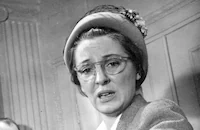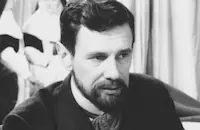In Which We Serve

Brief Synopsis
Cast & Crew
Noel Coward
Noel Coward
John Mills
Celia Johnson
Kay Walsh
Bernard Miles
Film Details
Technical Specs
Synopsis
Survivors of a bombed British destroyer think back on the paths that led them to war.
Photo Collections
Videos
Movie Clip




Hosted Intro
Film Details
Technical Specs
Award Nominations
Best Picture
Best Writing, Screenplay
Articles
In Which We Serve
In Which We Serve was partially based on an actual disaster in the Royal Navy, and employed a semi-documentary style and a striking flashback structure in the storytelling. German torpedoes sink the British destroyer, HMS Torrin, and several survivors struggle to an inflatable lifeboat. While Luftwaffe planes crisscross the ocean and strafe the men, three of the survivors recall their time aboard the ship and their families at home. Seaman Shorty Blake (John Mills) thinks of his courtship with Freda (Kay Walsh). Chief Petty Officer Hardy (Bernard Miles) recalls his wife Katherine (Joyce Carey), bravely standing up to the London blitz. Capt. Edward Kinross (Coward) himself thinks back on his family - especially his wife Alix (Celia Johnson), who knew that she would always have a rival for her husband's attentions -the Torrin. The writing and playing in the domestic scenes are quintessentially British; while the mannerisms of the various couples depicted may all be differentiated by class, they nevertheless share a common trait - all put on a game face and unhesitatingly put duty before the pursuit of personal happiness.
Noel Coward produced In Which We Serve, co-directed, co-wrote the screenplay, composed the musical score, and played the leading role. By all accounts, Coward became easily bored wearing the director's hat, and left the majority of those chores to his co-director. That co-director was one of the most respected editors in the British film industry, David Lean -it was his first official credit following some uncredited work on George Bernard Shaw's Major Barbara (1941). In addition to the many scenes of domestic life and family relationships, there are also several contrasting action scenes as the Torrin and her crew engage in fierce battles with the enemy. These scenes were comprised of a combination of actual war footage cut together with shots of elaborate studio miniatures.
The events which drive In Which We Serve are loosely based on the experiences of Coward's personal friend Lord Louis Mountbatten, Captain of the destroyer HMS Kelly, which was sunk in the battle of Crete in May, 1941. The film was a showcase for a number of leading British actors, and was the notable debut of Richard Attenborough. Though he was uncredited, Attenborough had a sizable and memorable part as the only sailor who fled his post in the heat of battle, as the Torrin fought off the coast of Norway. Also turning up in her film debut is one-year-old Juliet Mills, appropriately enough appearing in the arms of her father John, as the child of Shorty Blake.
In Which We Serve was nominated for Oscars® for Best Picture and Best Original Screenplay in 1944. While the film lost to Casablanca (1942) and to Princess O'Rourke (1943) in those categories, Noel Coward had already been presented with an Honorary Academy Award in the previous year for "his outstanding production achievement." David Lean went on to direct three more adaptations of Coward's writing: This Happy Breed (1944), Blithe Spirit (1945), and the wildly popular Brief Encounter (1945).
Producer: Noel Coward, Anthony Havelock-Allan, Herbert Smith
Director: Noel Coward, David Lean
Screenplay: Noel Coward
Cinematography: Ronald Neame
Film Editing: Thelma Connell, David Lean
Art Direction: David Rawnsley
Music: Noel Coward
Cast: Noel Coward (Capt. Edward V. Kinross), John Mills (Shorty Blake), Bernard Miles (CPO Walter Hardy), Celia Johnson (Alix Kinross), Ann Stephens (Lavinia Kinross), Daniel Massey (Bobby Kinross).
BW-115m.
by John M. Miller

In Which We Serve
Quotes
Trivia
The Hays office tried to delete the words "God", "hell", "damn", and "bastard" from the American release. Uproar from England forced the office to back down on everything except "bastard".
John Mills' character's baby, born in the air raid that kills Bernard Miles' character's wife and mother-in-law, is played by 1-year-old Juliet Mills.
Noel Coward was a friend of Lord Louis Mountbatten, who was Captain of the Royal Navy destroyer HMS Kelly from the outbreak of the Second World War until Kelly was sunk by enemy action in May, 1941. Coward wrote the screenplay for this movie based on Mountbatten's experiences on HMS Kelly.























